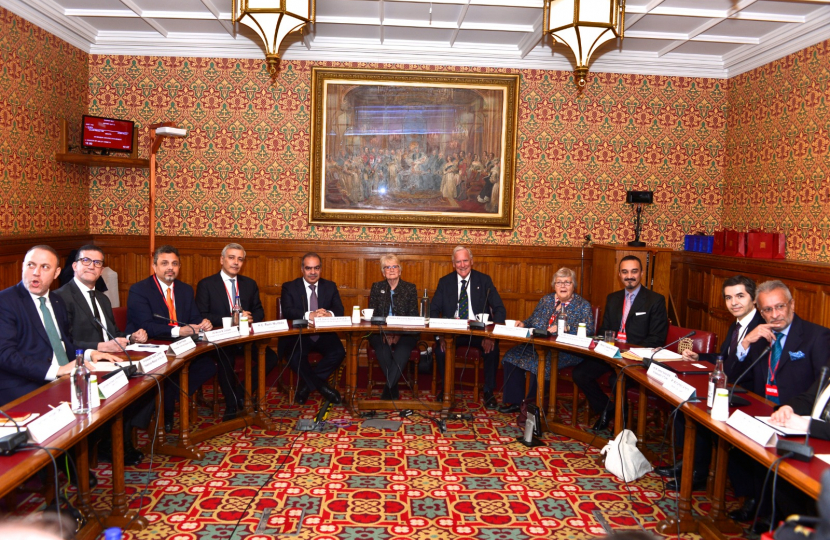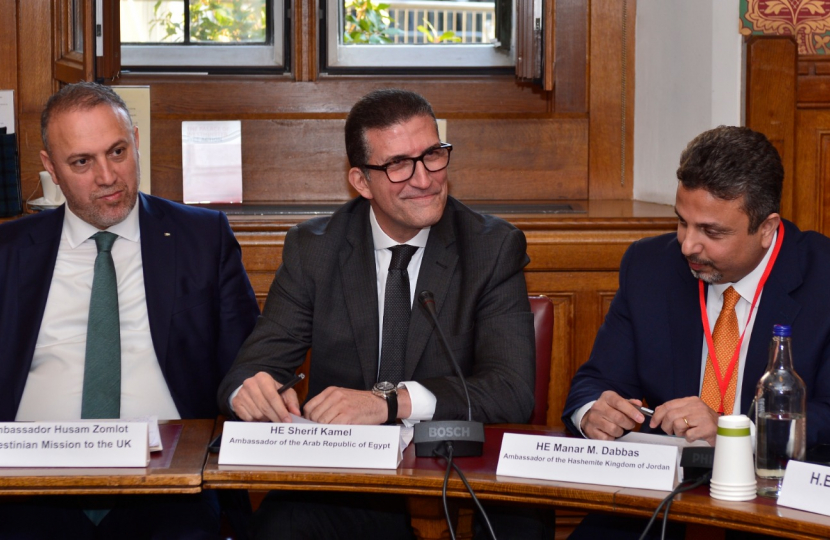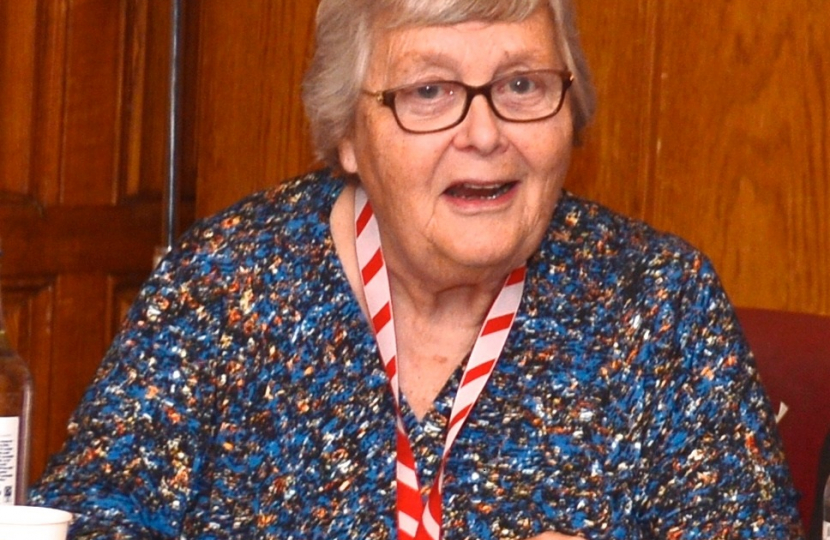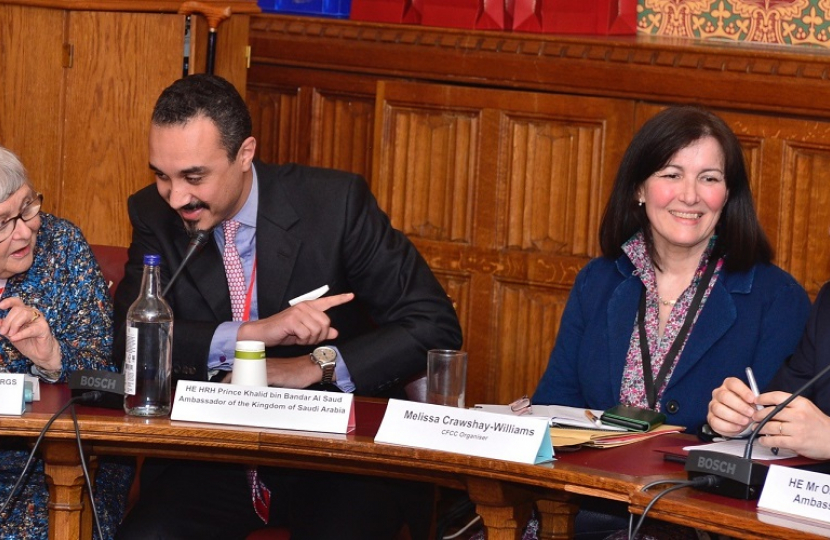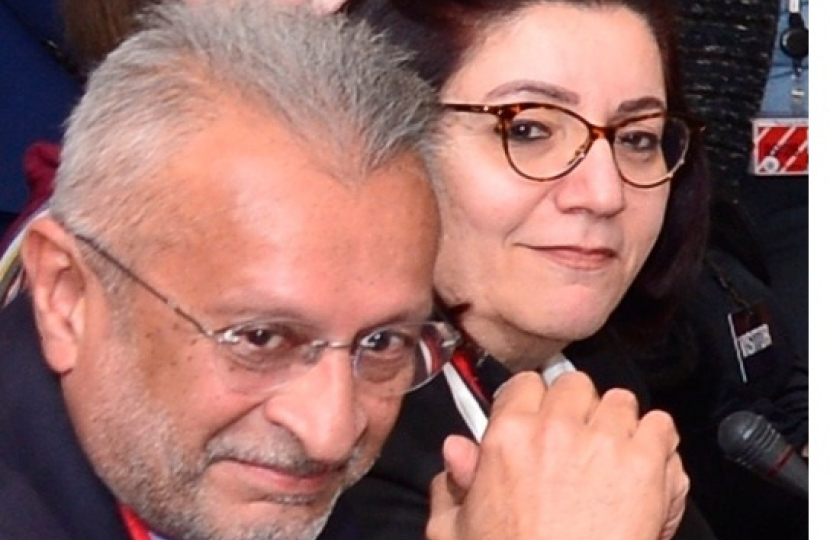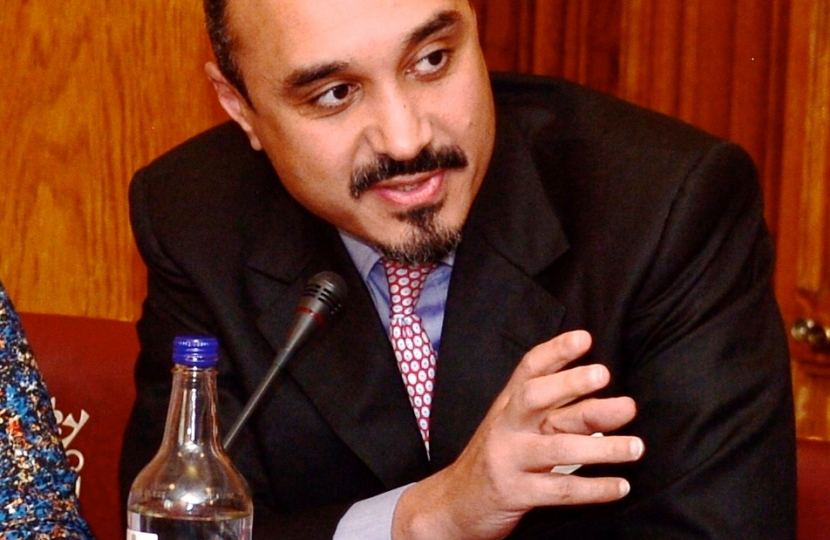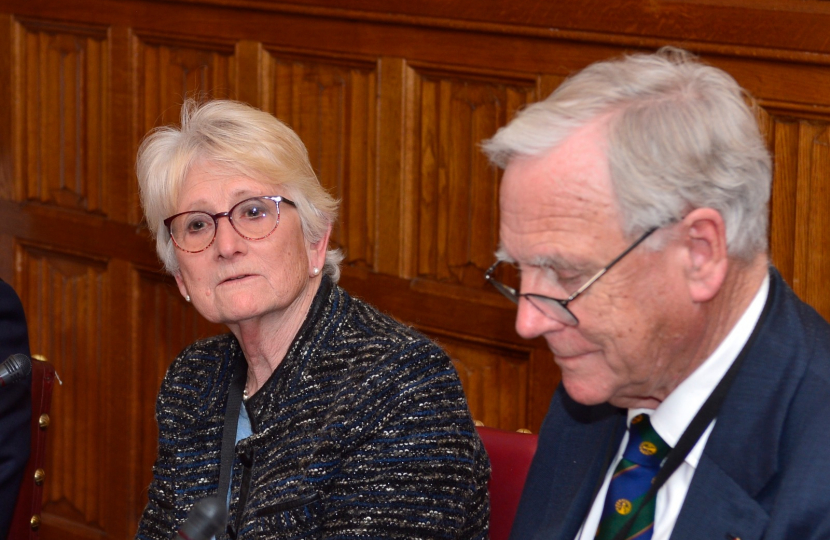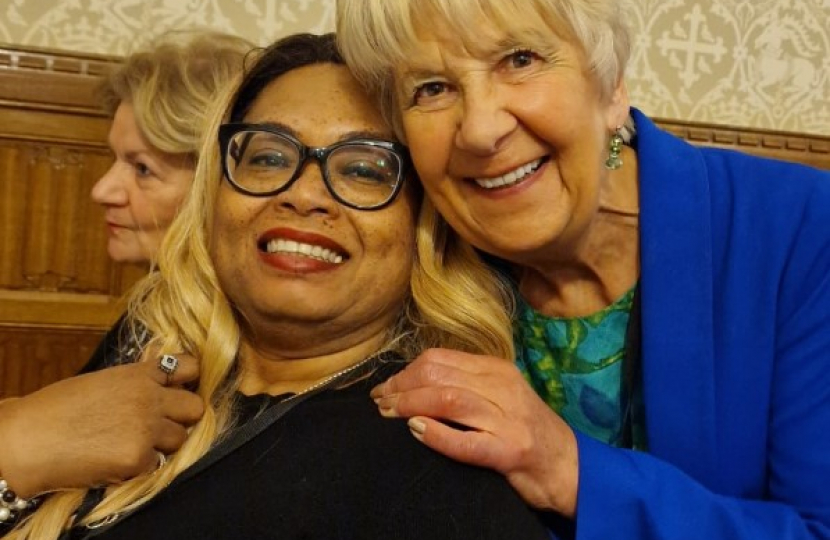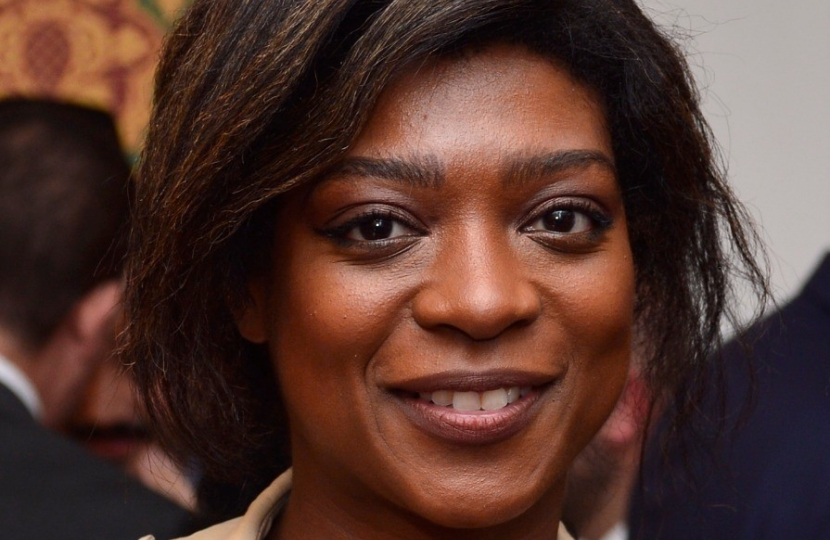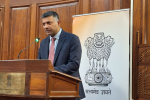Panel Discussion with Ambassadors of Bahrain, Lebanon, Saudi Arabia, Jordan, Egypt, Turkey, Lebanon, the Palestine Ambassador and Attache at the Embassy of Oman.
Chaired by Rt Hon Baroness Neville-Jones
With Rt Hon Lord Taylor of Holbeach CBE, Baroness Nicholson of Winterbourne, Baroness Hooper CMG and Lord Ranger CBE
Lord Ahmad of Wimbledon, Minister for the Middle East, addressed those attending the dinner.
Report of the event
On the 17th April we were delighted to invite Middle Eastern Ambassadors from Bahrain, Lebanon, Saudi Arabia, Jordan, Egypt, Turkey, Iraq and Palestine, to a panel discussion on their future visions for the region.
New CFCC Chair, the Rt Hon Baroness Neville-Jones opened the discussion, remarking that it would be extremely instructive and helpful to hear from representatives of the region on what they considered to be the important issues and the future role of the Middle East, nationally and internationally.
CFCC President, the Rt Hon Baroness Chalker of Wallasey FRGS expressed that she was keen to make the most of the opportunity to hear the ambassadors’ views on how we proceed as friends, to make the Middle East an even better place.
Each ambassador proceeded to share the perspectives of their home nations and the achievements and challenges within the region.
The Ambassador of the Kingdom of Bahrain, HE Shaikh Fawaz Al Khalifa, opened talks with his vision for the Middle East. He remarked on the changes that would have been unthinkable only a few months ago and his optimism, thanks to the rapprochement between the Kingdom of Saudi Arabia and Iran, and the leading role China played in facilitating it. He talked of his admiration for genuine dialogue between the regions; noting that Bahrain was convinced that building dialogue and mutual respect was the surest way to achieve peace and stability in the region.
He professed his pride that Bahrain was among the signatories of the Abraham Accords and they had moved quickly to implement the practical benefits such as: health, clean energy and tourism.
The Ambassador of Lebanon, HE Rami Mortada, also noted the significant role of China as a peacemaker and dealmaker in the region.
He observed shifting dynamics and shrinking western influences, characterised by local actors in the region adapting to this new reality and taking the lead to develop partnerships.
He warned that conflict remained the major source of instability in the region and beyond, and until this was resolved stability and safety in the region could not be achieved. Disengaging from the Middle East, he added, was not an option.
HE HRH Prince Khalid bin Bandar Al Saud, Ambassador of the Kingdom of Saudi Arabia stressed how important it was to maintain engagement with all Middle Eastern ambassadors. He added that Britain had an important role and as one of their oldest allies, the relationship should be built on.
Prince Al Saud, said in the Middle East it was time to put their collective heads above the parapet and not just focus on domestic issues, at the cost of the rest of the world.
HE Manar M. Dabbas, Ambassador of the Hashemite Kingdom of Jordan noted the importance of more positivity in the way the Middle East is viewed. He pointed to the region emerging as a solver of key challenges; with an optimistic outlook, creativity and innovation - not just a leader in oil and gas, despite exporting more than £2 trillion worth.
Ambassador Dabbas noted that what happens in Jerusalem doesn’t stay in Jerusalem, but reverberates through Europe. He recognised that the Middle East was doing the heavy lifting and no longer dependent on others. He noted that the potential of the Abraham Accords would not be fully realised until the scourge of occupation was resolved. He advised that we look to the Arab Peace Initiative put on the table 20 years ago, which could serve to bring peace in the region.
Baroness Chalker added that she would never forget the help Jordan provided with the refugees in Kuwait.
Ambassador of the Arab Republic of Egypt, HE Sherif Kamel, wanted to raise awareness for the struggle of the Palestinian people, and urged that it was critical the two-state solution was preserved.
He observed that a number of countries in the region were in conflicts in their own boundaries and various UN mechanisms were working to end them.
He noted that refugees and displaced people was another important challenge in the region, and stressed the importance of offering them work opportunities. Another challenge he mentioned was water scarcity and the need for access to water to be a protected right. He welcomed the cessation of foreign interference, bringing national institutions back into existence and building them where they did not exist.
The new Ambassador for Turkey, HE Mr Osman Koray Ertas, addressed instability in the region, concluding that we often focus on the symptoms rather than the root causes. He recommended a stronger focus on the sectarian divide in the region, radicalism and Palestine. He said it was crucial that Middle Eastern nations continued to prioritise putting their own houses in order to create a better future and hope for younger generations.
Mr Ertas stressed the importance of supporting key regional countries like Iraq and Lebanon, to restore stability and not let them down. He noted the interest Russia and China had taken in new projects following the retreat of the West.
Ambassador Husam Zomlot, Head of the Palestinian Mission to the UK, wanted to focus on the UK. He said that since the mid 40s the UK had been a leading force in three major events. The first was the end of WWII, the second was learning from that horror by establishing the post WWII, order a few metres away in Westminster Hall; and the third was the direct role it played with the Balfour Declaration in establishing Israel in Palestine without regard for the indigenous people.
Ambassador Husam Zomlot affirmed that three things needed to be reassessed. The first was the continued denial of what had happened, the second was recognition of the state of Palestine and respect of the two state solution; and the third was recognition that international law had been broken, with Israel in violation and a request for the full and equal application of international law.
Ms Jwan Khioka, Minister Plenipotentiary, Embassy of Iraq expressed Iraq’s vision for a more global Middle East. Ms Khioka reaffirmed the strategy to adopt partnerships with countries worldwide and Iraq's commitment to fighting terrorism in Iraq and elsewhere.
She noted that climate change and water security were real challenges in Iraq. The prime minister promised to take serious measures to tackle climate change by 2030 and to enhance the rights of women and children in conflict situations.
She added that Iraq believed in improving tensions in the region and recalled that conversations between Saudi Arabia and Iran were hosted in Baghdad prior. She added that the Iraqi vision for justice wouldn’t be realised until an independent Palestinian state was achieved.
Baroness Neville-Jones drew proceedings to a close, noting key takeaways as: the growth of institutions and an increasing degree of diversity; the absence of the West and the absence not seemingly a welcome one.
Baroness Hooper expressed how beneficial an educational exchange would be, particularly for our students to go to the region to learn more, firsthand.
The ambassadors agreed on the soft power of the UK being its greatest strength, most starkly demonstrated through education. The Saudi Arabian ambassador said that if you looked at the creme de la creme of the Arab world, they studied in the UK.
He noted that the Kingdom of Saudi Arabia offered 30,000 students scholarships in the UK and they were now hoping to offer UK students scholarships in Saudi Arabia, so that the next generation could really engage on the ground.
The Iraqi ambassador also unveiled an initiative to host international students to study in Iraq and understand Iraq more.
The Turkish ambassador spoke of the hope in the region and observed that were the evening’s event to have happened three years ago they would have had less positive things to say about each other.
The Saudi Arabian ambassador reflected that you can always tell the difference between a friendship and relationship, based on what you want from each other.
-
Dinner followed in the Attlee room with the ambassadors, speaker Lord Ahmad of Wimbledon, Minister of State for Foreign, Commonwealth and Development Affairs (Middle East, North Africa, South Asia and United Nations) and Chair Rt Hon Baroness Neville-Jones.
The opening words were delivered by the Rt Hon Baroness Neville-Jones, who invited Lord Ahmad of Wimbledon to the floor.
Lord Ahmad spoke of receiving the invitation from former House of Lords Chief Whip, Lord Taylor and joked that when the chief whip asks you to make room in your diary, you do. Lord Ahmad expressed his thanks and admiration of Baroness Chalker and Baroness Neville-Jones.
Lord Ahmed remarked that the Middle East remained as important today as it did with early trade routes, and today’s relationship between the UK and the Middle East could be defined by partnerships.
He expressed that taking on the MENA (Middle East and North Africa) brief had been an honour. He recounted his travels across the region: celebrating the World Cup delivered by Qatar, establishing trade ties and strong collaboration in a range of emerging sectors, such as health and climate.
He said it was right to have candid and open exchanges and the UK welcomed the progress that had been made on the Abraham Accords.
He noted that the Palestinian issue wasn’t just an issue for Palestinians and Israelis. It impacted everyone. He confirmed that the UK believes in the two state solution and that peace in the Middle East could not be sustained until we see peace between Israelis and Palestinians.
He added that our strong relationship with Israel should not be to the detriment of our other partners and friends in the Middle East.
He concluded that the Middle East matters because what happens in the Middle East affects everyone else.
Questions were taken from the floor and a vote of thanks was given by the Rt Hon Baroness Chalker of Wallasey
Jamila Robertson

